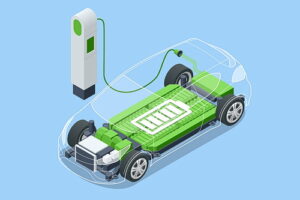
The Summer of EV Love
It’s August and you just bought an electric car. You charged it up to 80% capacity (that is the recommended maximum charging) and your dashboard shows 230 miles of available for your car.
Now it is December and your car still shows 230 miles when charged to 80%, but when you start to drive, you notice that the mileage diminishes faster than when you were driving it during the summer. Why is that? Let’s take a look.
Why Do EV (Lithium) Batteries Decrease in Capacity Faster in Winter?

-
- Ion Depletion: Cold weather reduces the chemical activity of the lithium ions. Ions are atoms that have either gained or lost electrons, allowing them the ability to bond with other atoms. This is the normal process in battery charging, but when cold weather comes, the amount of ions in the atoms decreases, thereby reducing the charging process. In other words, the battery can’t store as much energy as it would normally do when in warmer weather.

Photo: Pixaby
- Ion Depletion: Cold weather reduces the chemical activity of the lithium ions. Ions are atoms that have either gained or lost electrons, allowing them the ability to bond with other atoms. This is the normal process in battery charging, but when cold weather comes, the amount of ions in the atoms decreases, thereby reducing the charging process. In other words, the battery can’t store as much energy as it would normally do when in warmer weather.
- Viscosity: Cold weather increases the thickness of the electrolyte, known as viscosity. This makes it harder for the ions to move around within the battery, which reduces the battery’s energy, e.g. its ability to deliver power.
- Plating: Over repeated charge and discharge cycles, some of the ions can stick onto the surface of the anode, known as lithium plating, which forms a solid layer of lithium metal.
This can reduce the capacity of the battery and potentially lead to short circuits and is more likely to occur at low temperatures or when the battery is charged or discharged too quickly.
Note: At temperatures below freezing, some lithium batteries can lose up to 50% of their juice.
What Can I Do to Compensate for This Loss of Energy?
- If you have a garage, use it. Even if the garage is not heated, it would still be a bit warmer than if the car was in your driveway or on the street.
- Charge your batteries regularly. This will help to prevent them from discharging too deeply.
- Avoid fast charging. Fast charging can generate heat, which can damage the battery and reduce its capacity. That doesn’t mean that you shouldn’t use a fast EV charger, but be cognitive about how often you use one. Maybe in the future, as this technology advances, this won’t be as much of a problem as it is now.
Summary
Lithium batteries, whether in a car or for any device diminish in capacity when in winter time. This is because of the decrease in ion capabilities when in cold weather. There are however a number of things you can do to circumvent this decrease, but they are not 100% reliable after you take the vehicle out for a drive.
Best bet would be to move to a warm climate. Then you never have this problem ????.

